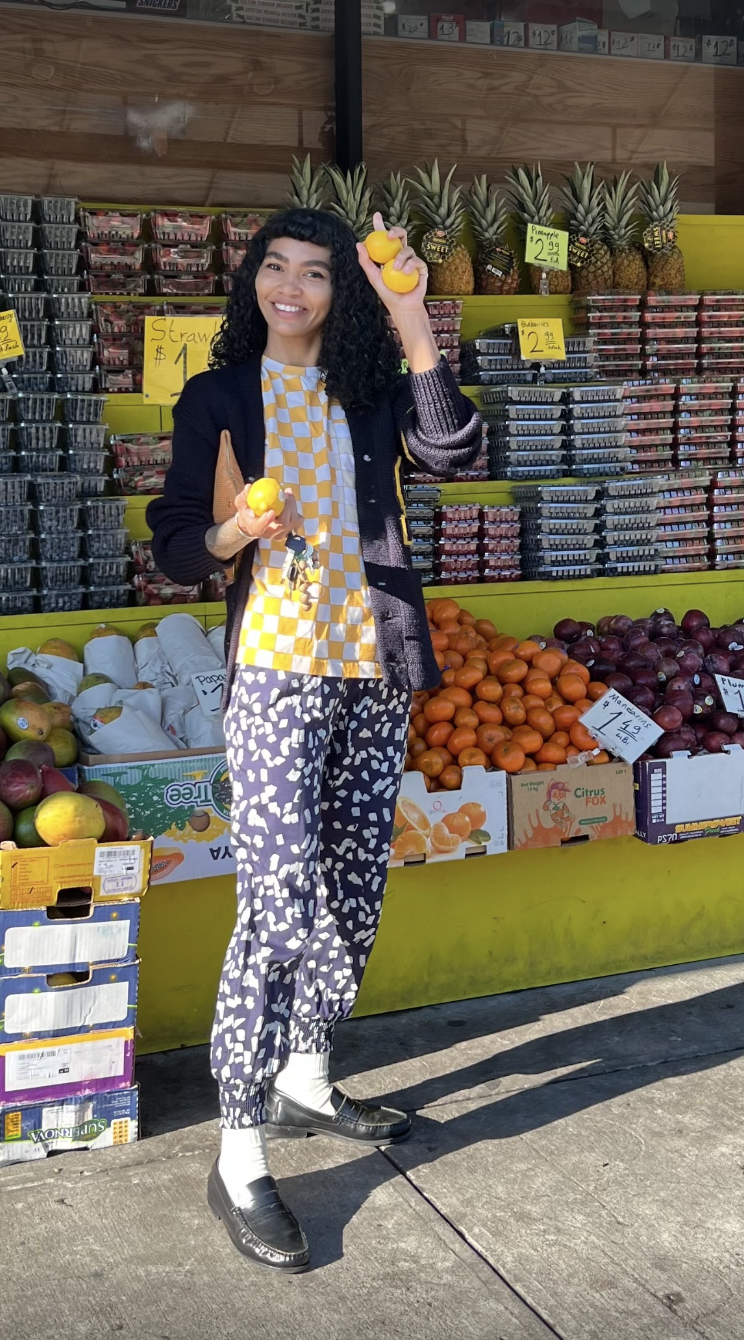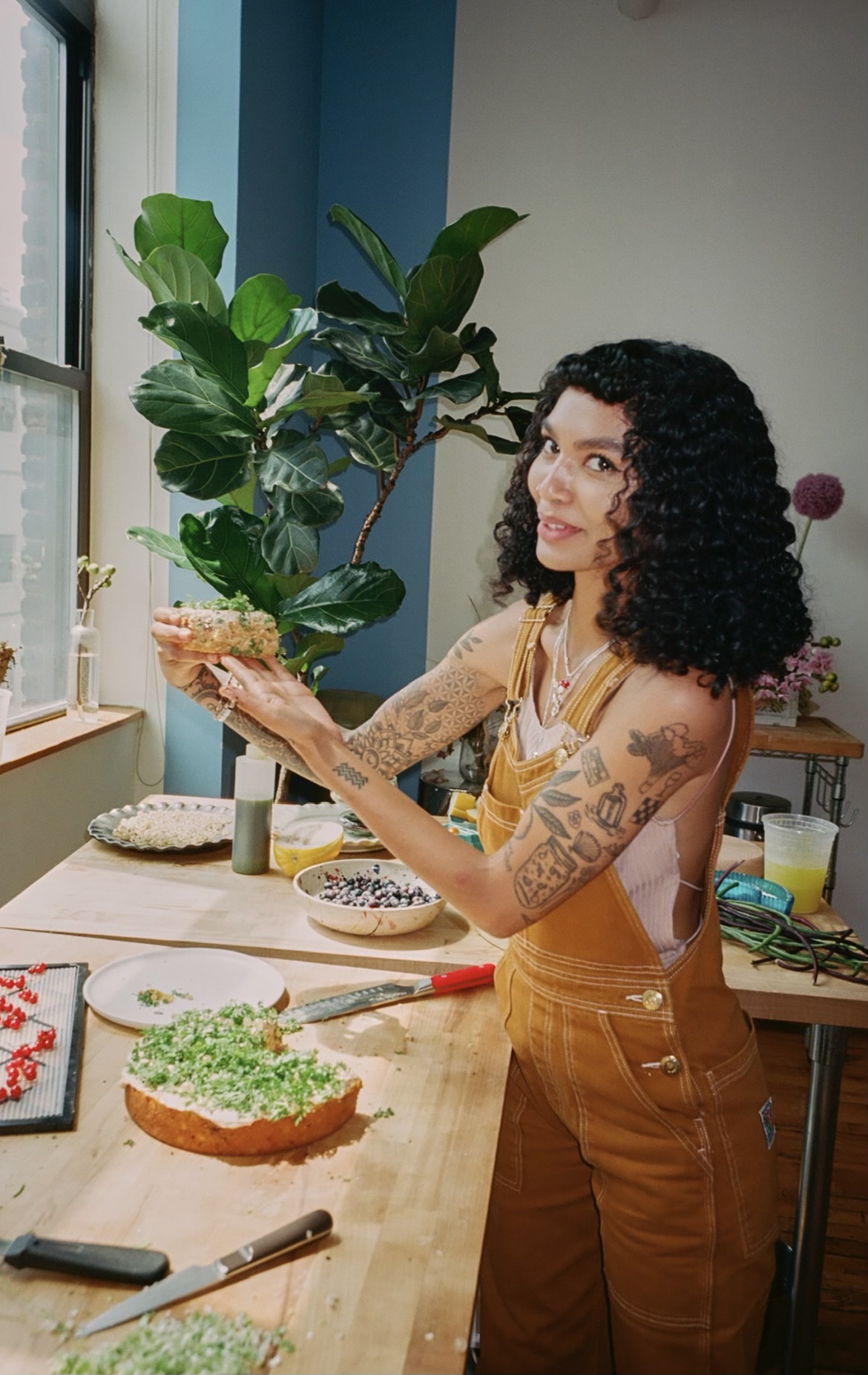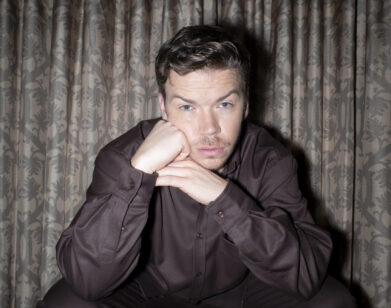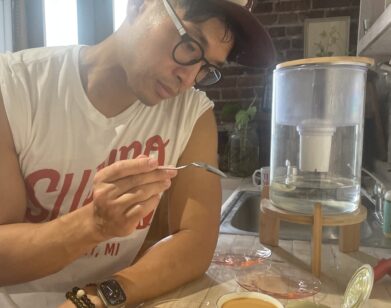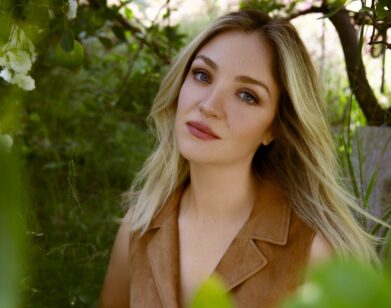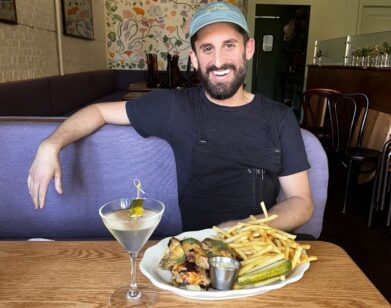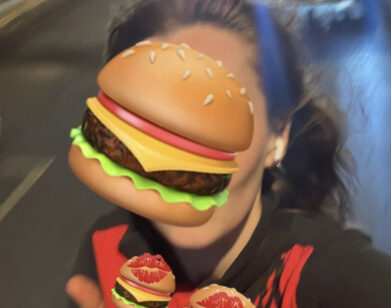YES CHEF
Sophia Roe Gives Andy Baraghani Some Food for Thought
When Sophia Roe describes the premise of her docuseries Counter Space, she keeps it simple: “Food is news.” In the recently released second season, Roe visits a kelp farm in Connecticut, talks ethical tequila with Eva Longoria, and eats fried rice in the largest Chinatown in the Mississippi Delta. Spirited and infectiously curious, Roe approaches each vastly different segment with the same bright enthusiasm and willingness to learn. Counter Space feels particularly timely in our current moment, where food is not only newsworthy but a massive cultural preoccupation. The gory class satire The Menu and 2022’s breakout hit The Bear captivated audiences with glimpses of the high-pressure world of fine dining. Some restaurant reservations can be as sought after as concert tickets. Celebrity chefs like Roe have become bonafide celebrities. But while she’s happy to trade wine bar recommendations and share her own carefully composed food pictures, Roe is more concerned with stories about the work of farmers, purveyors, and line cooks than an imperious chef de cuisine’s vision or an influencer’s pop-up dinner. After experiencing food insecurity in the Florida foster care system and then rising through the ranks of Michelin-starred institution Eleven Madison Park, Roe has become one of the biggest food personalities of the Instagram age, with a unique perspective that makes her singularly suited to take on the job of hosting Counter Space, a show that seeks to explore food in all its facets. After running home from an appearance on The Drew Barrymore Show, Roe talked shop with fellow food world multi-hyphenate Andy Baraghani, chef and author of The Cook You Want To Be, swapping hot takes on canceling plans, sceney bars, and FoodTok.
———
SOPHIA ROE: Andy, thank you so much for doing this.
ANDY BARAGHANI: Of course. You’ve been running around all day.
ROE: I’m a little bit fried. I’m not complaining, but it’s been a day.
BARAGHANI: I actually just walked in the door. I haven’t been running around to be on [The] Drew [Barrymore Show], as I just saw you were, but I’ve been running around doing less glamorous stuff.
ROE: Well, I’m going to keep it casual. The coolest thing ever is that we just get to talk. And I just kept thinking about how things haven’t really aligned and I’ve always wanted to just chat with you. I saw your list for 2023, of things that are in versus things that are out. And something that was in was not canceling on plans as much.
BARAGHANI: I said it out loud for myself and for others because we have gone through a good two-plus years of accidental, forced isolation. And I want to embrace being able to interact and see the people that we love again.
ROE: Same. Even just the feeling of it. I never used to get this weird anxiety to see a person. I’m out of practice. 2019, 2018, I did shit every night. I was out.
BARAGHANI: I was a party boy. But now we’re both in relationships. I’m very much a homebody now.
ROE: It’s different now. Or it should be, kind of has to be.
BARAGHANI: Absolutely. As a reminder, I hope you are taking a moment today, the next day, this week. I feel like a lot of people within our space don’t tell each other that.
ROE: It’s true.
BARAGHANI: Season two of Counter Space, did you manifest this? Tell me about it. I want to know if you are the type of person who knew this was going to happen?
ROE: I can’t believe it every day. I grew up so poor. When I did have food, I was sharing it with everybody. I knew that food was something I wanted to do, but from almost a selfish perspective. I just wanted to grow up and do food so I could eat what I want and not have to share it with everybody. I was a very curious kid. I can’t say I knew I’d always have a TV show, but I always wanted to be a star.
BARAGHANI: You used the word curiosity, which I continue to think about through my own experience both in and out of the kitchen. In order to evolve as a cook, as a human being, you have to stay curious and push yourself into these unknown territories. And it’s something that I have to practice daily. How do you sustain that curiosity?
ROE: Well, you’re one to talk. You’re like, “Hi, I’m in fashion.” “Hi, I’m a restaurant cook.” And “Hi, I’m a writer.” Oh, please. [Laughs] Well, I’m going to answer and then I’m going to counter-ask.
BARAGHANI: Great.
ROE: My answer is so simple. We’re humans, we’re meant to be lifetime learners. We’re not meant to be one thing. I am a cook but I’m also a storyteller. There are a bunch of different things that I like to do. And it’s so rad when I’m able to do all of them at once. When you’re able to create a project that feels like there’s overlap, it’s gorgeous.
BARAGHANI: Absolutely. Not setting parameters or feeling confined at all.
ROE: Exactly. Food is woven into every little thing that we do. It’s in every decision. It’s farming, industry, and ecology. My most popular medium is food, but it’s not the only one. And for you is it—well, which Andy do you prefer today? Is it the writer Andy? Is it the cooking Andy? Is it the travel Andy?
BARAGHANI: A big part of it, and I don’t think I fully acknowledged it until I became an adult, is that I’m a child of immigrants. My parents are from Iran. And that obviously had a huge impact on how I think about food, my upbringing, how I interact with people, and how I carry myself. That love for food started with the act of eating and the immediate pleasure food brings you. And by the time I was maybe 11 or 12, it expanded to the idea of, “Oh, what happens when you combine a handful of ingredients, and how does that transform them?”—to the point where I ended up pursuing it professionally and working in restaurants. My first break away from the food space, because I started so young, was working with the current editor-in-chief of Interview magazine. And I feel like I have to get the story in because it only makes sense for it to be in Interview.
ROE: I love it.
BARAGHANI: I loved fashion. I always looked through my sister’s Vogue. But I grew up in the Bay Area, California, and didn’t know anyone in that world. I came [to New York] when I was 18 and I looked through all the fashion magazines. And I would look at the credits and my favorite features and my favorite stories were the ones that Mel [Ottenberg] styled. And one night, I swear—it was February 2009, something like that, I saw him on the street. I was very gutsy and I just went up to him and I said “Are you Mel Ottenberg?” He knows the story. And he said, “I am.” And it’s, “Oh, I really love your work.” I went back home and I found him on Facebook, my crazy ass back in the day.
ROE: [Laughs] You are amazing!
BARAGHANI: I wrote him a message and I said, “Look, I want to work with someone that I really admire.” He got back to me and he said to have an interview at his office, and I spoke to him about fashion, my favorite blogs at the moment—
ROE: King.
BARAGHANI: And he brought me on as his intern. He put me to work and he allowed me to be on set. And I was so enamored. I learned so much about being efficient and having a clear eye and aesthetic that continues to evolve. I have a very specific aesthetic that didn’t necessarily develop right off the bat. ”Oh, that’s very Sophia Roe, that’s very Andy Baraghani.” It took a long time for me to harness that.
ROE: It just goes to show that all those little things you do really do come to value. They have a purpose. You don’t even work in fashion, but you’re still absolutely using whatever those skills were.
BARAGHANI: Absolutely, but I want to talk more about Counter Space. I have a lot of questions. In the show you say, “Food is news.” What’s the story that you covered in season one that you felt particularly captured that? What kind of food stories do you think get too much attention at the moment? I feel like we both have a lot of opinions on that.
ROE: I have a lot to say. But I’ll pivot and say what I wish got more attention instead of what gets too much. I wish that we heard more from farmers. I cannot be who I am without them. No cook can. I need to hear more about the people that actually make the food on our plate possible.
BARAGHANI: Food is only as good as the ingredients that we’re using, which starts way before us, with the purveyors and farmers. It’s really bothersome because, yes, people want recipes, people want to hear about restaurants, but people really should have a better and deeper understanding of their food and the people behind it.
ROE: I do see that there’s a bit of a pivot from people just being obsessed with fine dining. In fact, everybody’s really happy to hate on fine dining. You see it with all this food TV.
BARAGHANI: Did you watch The Menu or The Bear?
ROE: I watched both.
BARAGHANI: I have a hard time watching food shows or movies unless it’s a documentary. I don’t know what it is. I’m not laid back so I’m like, “Okay, that’s not at all how it is.” But I did watch The Bear. I do want to watch The Menu.
ROE: I went in with The Bear with high hopes. I did think that there were some parts that were very realistic. Every cook in the world knows what it is to cry in a walk-in when you fuck something up. Now, I don’t want people everywhere thinking that The Bear is the standard and that every single kitchen is like that. Because most kitchens are not like that. Most kitchens are not this guy going crazy, screaming his head off every single day.
BARAGHANI: We’ve both left the restaurant industry, but we’ve both done pop-ups. And while that is very different than working at a restaurant day in and day out, it reminded me that the camaraderie that exists in the hospitality industry is very unique. I did have some relief that I do not work in restaurants anymore and I don’t plan to ever pursue that again. But I still have a great deal of respect for not just the cooks at restaurants, but the whole entire idea of what a restaurant can be. And when everything is balanced and right and it almost feels like, not to be cheesy, but to compare it like an orchestra. When everything runs smoothly, it’s a high. There’s nothing quite like it really.
ROE: However, I’m really worried about my restaurant cook friends.
BARAGHANI: Absolutely.
ROE: Because they have been working in restaurants for years and no one knows who they are. But people know about this TikToker, this Instagrammer—
BARAGHANI: You’re going to a very sensitive place.
ROE: I know. It’s not a bad thing, it’s good that people know about home cooks. What I want to set the record straight on is these are different buckets of people. A restaurant cook is different from a content creator. They are not the same thing.
BARAGHANI: It gets a little tricky, I have to say. And for all the people who are reading this, Sophia and I are not hating on anybody, by the way.
ROE: Totally. They’re just different.
BARAGHANI: They’re just different. But working a restaurant, you never quite get the same level of respect and compensation. I imagine it can be very frustrating to see people being able to make a lot more money in food without ever having worked in a restaurant.
ROE: My comments aren’t really in support of one or the other. But my restaurant cook friends are really stressed out. They’re literally losing work to influencers. You know how many creators send me messages? “Soph, I got this offer to do this big dinner, I’ve never done a dinner.” And I just sometimes want to be like, “I don’t think that’s your bag, babe.”
BARAGHANI: And that’s okay.
ROE: It’s okay! And I also think it’s up to brands to be smart about that too. Be mindful of what you’re asking for. You’re asking a content creator to be a restaurant cook. That’s not fair and that’s not nice. Don’t put them in that situation. Ask cooks to cook and ask content creators to create content.
BARAGHANI: Agreed. One thing I wanted to ask before I forget, we both live in New York. We’re both Brooklynites. Well, I left Brooklyn, and now I’m back.
ROE: Stay. It’s great.
BARAGHANI: I’m staying put.
ROE: Good.
BARAGHANI: Well, New York—the city, the people, the food—has continued to be an inspiration in so many different ways for the last 15 years of my life. I’m curious, are there specific restaurants or purveyors you couldn’t do without?
ROE: Yes. I love this place, Daughter. It’s in Crown Heights. It’s wine, but there’s small plates. It’s one of those kinds of places. I am obsessed with the Saraghina Bakery because honey, if I need something last minute, some bread, some olives—
BARAGHANI: Anything!
ROE: That place has saved me more than a few times. It really, really has. Same with that Greene Grape Store. It’s expensive. But it’s the one place where I can get an out-of-season passion fruit to test a recipe. And let me just say my thing about Le Dive. Their food is so fucking good. I am so tired of hearing about how it’s a scene and how the wine is good. No one talks about how good the food is.
BARAGHANI: This has happened with a handful of restaurants over the years. When Four Horsemen first opened up, it was all about the wine or the design.
ROE: I love that place. Also Nami Nori in Williamsburg. That’s one of those places where my partner, Chris [Calderon], and I will look at each other and be like, “Nami Nori?”
BARAGHANI: I want you to check out Place des Fêtes. Opened up maybe a year ago.
ROE: Oh my god, that place is amazing.
BARAGHANI: It’s so good.
ROE: The amount of times Chris and I have squeezed into that tiny space. He’s a big guy.
BARAGHANI: We all know. [Laughs] Anybody who follows you knows. I was about to look back at our messages, “Oh, am I commenting about her partner a little too much?”
ROE: Listen, you wouldn’t be the only one.
BARAGHANI: Something that I’ve been thinking about is, I don’t know the exact number, but certainly thousands of restaurants closed due to the pandemic. Restaurants that had been open for mere months to restaurants that had been around for decades. If there’s one good thing that has come about this is that it has brought in a new generation of cooks.
ROE: I love it.
BARAGHANI: People never thought they would ever be able to cook and have a storefront in New York City. They do now. Whether it is a permanent brick and mortar or it’s a pop-up.
ROE: It’s true. There’s so much variety, because there’s space.
BARAGHANI: It’s also becoming more regional. We’re seeing it when it comes to Indian cuisine, Thai cuisine. I’m very happy to see it even within Iranian cuisine where it’s not just the general category of a specific country, but it’s really much more regional, focusing on specific dishes that highlight one area of the country. I don’t necessarily think it’s easier to work in a restaurant now than it was before, per se, but I do want to feel hopeful that they are moving in a better direction.
ROE: They have to be. I feel that even in food media and food writing. Have you seen the new Ghetto Gastro book?
BARAGHANI: Of course.
ROE: Black Power Kitchen. It is such a perfect blend between art, photography, interviews, recipes, and concept. It is so clear that these people are such New Yorkers. I love it.
BARAGHANI: Such New Yorkers. It’s beyond a cookbook. It’s bringing in culture in a way that is very difficult for most cookbooks to capture.
ROE: It’s so good. When you look at most food TV, like what’s on the Food Network, it’s like that sort of appetizer, entree, dessert format. Is that outdated? I feel like we need to retire that theme. Your cookbook is a whole story. My cookbook doesn’t have a snack section, but yours does. That’s so intrinsically you.
BARAGHANI: My book is called The Cook You Want to Be, but the very first title that I thought of was “The Cook I Want To Be.” And I’d say halfway through writing my manuscript, I decided, as personal as this book is, it doesn’t begin and end with me. It really is about bringing the reader in. When it comes to snacks, there are so many things that I love that do not necessarily fall under a neat category. But these are things that I crave and I want.
ROE: That’s what’s so magical about it. You’re hearing about a person’s story and their life. I hope we see more of that because I feel like cooks have things to say. There’s some shit to share. There’s a lot that goes into someone who makes food for other people every single day. I don’t want to take more of your time, but this was so fun. We have to fucking do this in person.
BARAGHANI: We’re going to do it in person. We’re going to pig out at Thai Diner. But I want to say two things. One, this has been a privilege and an honor, and I’m so proud of you and huge congrats on season two of Counter Space. You have inspired me in so many ways beyond food. And I want you to keep doing exactly what you’re doing and be who you are. It’s so easy to fall in love with you and the community is only expanding.
ROE: Oh my god, what the fuck. Thank you so much. I can say the same for you. I wanted to do this with you for so long and I think you’re so special. I gush over you. I can’t wait to do it in person.
BARAGHANI: I can’t wait.

